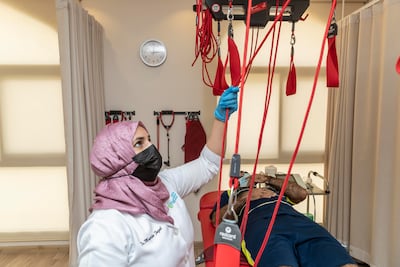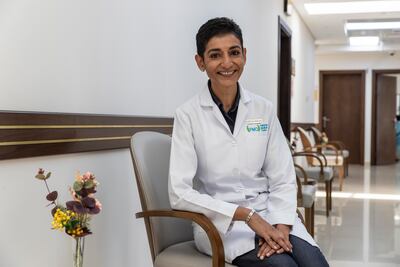A fitness centre built with funds donated by star Pakistani cricketer Shahid Afridi has become a crucial cog in the wheel of rehabilitation for Dubai patients suffering from long Covid.
The Pakistan Association Dubai-run clinic has treated more than 5,000 patients since opening in October, with growing demand for specialist care to help those hit hard by the virus get back on their feet.
Afridi – known in the game as Boom Boom because of his big-hitting heroics – endorsed the fundraising project to develop the Dh20 million ($5.4m) centre with charity events and auctions.
The cricketer raised and donated Dh1 million to the project, which allowed a sports fitness centre to open in his name. The centre has become crucial to the recovery of Covid patients.
“We started this project of providing free medical camps every month in 2009,” said Dr Muhammad Nasim Sabir, a clinical microbiologist at the Pakistan Medical Centre.
“Since then we have served more than 30,000 patients with only community help. It is a service for anyone who can not afford care, or whose insurance does not cover their treatment or medication.”

After installing isolation rooms to comply with new pandemic regulations, the clinic opened its doors to the public in October.
The centre has since come into its own, offering free support to those struck down by the virus requiring physiotherapy who may not otherwise have been able to afford rehab.
“We are trying to promote healthy living through our social media videos and medical consultations, as we know that is an effective way to avoid and survive Covid,” Dr Sabir said.
“The gym and rehabilitation unit has become very important in that. We were struggling to raise enough funds for the medical centre, so Shahid Afridi’s contribution was critical to the role this centre is playing now.
“The Dh1 million donation paid for a gym, not just to help with rehab, but also as a revenue stream for the hospital by providing membership options.”
Finance generated from gym memberships, which cost from Dh90 a month, are invested back into the centre to subsidise health care. The gym has attracted more than 90 members.
Health care at the Pakistan Medical Centre is either free or offered at around 80 per cent less than at most other hospitals.
A pool of 24 volunteer doctors give up their time and work unpaid to treat uninsured patients, while 43 full-time staff manage daily operations.
Around 90 per cent of donations come from the Pakistan community, but any nationality can visit for treatment.
One 84-year-old Canadian woman spent 24 days in intensive care after contracting Covid-19.
While unwilling to be named, MV said the rehabilitation she received at the PMC allowed her to recover enough to fly home to Canada.
“I came to this clinic in a wheelchair and now I’m running so it has been a really good experience,” she said.
“The doctor makes me work but it has helped me regain my strength. The whole concept of the gym and physio room has been perfect for my recovery.”
The centre has an annual operational budget of Dh3.8 million and aims to be self-sufficient within four years.
The Own a Brick campaign raised funds by encouraging the community to buy into the centre with donations from Dh200 to Dh1,000, which bought them association membership.

Clinical manager Dr Sadaf Jalil Ahmed volunteered for three months at the sharp end of the pandemic in Warsan, working on Covid isolation wards for 92 days from the end of March 2020.
“Rehabilitation from Covid is a learning process and we are only now beginning to understand the full impact on the general patient population,” she said.
“People have not been to see their doctor for some time and may have been living with high blood pressure or other potential problems like uncontrolled diabetes that can lead to kidney failure.
“Some have lost their jobs and would not otherwise be able to access health care without this centre.”











